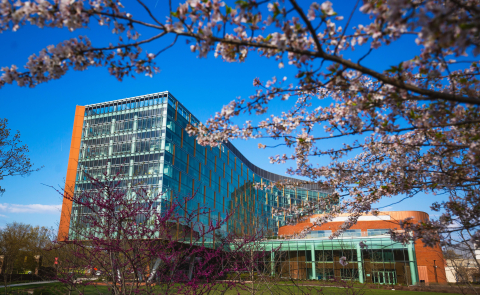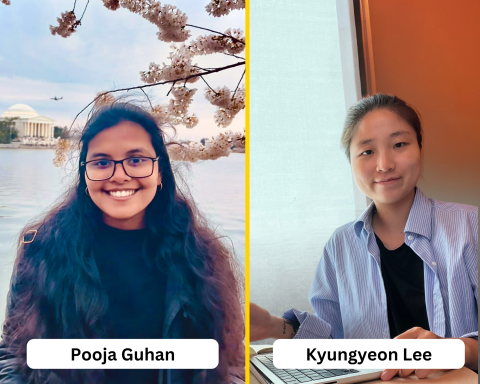Recent News & Accomplishments
2024
Mihai Pop discusses computational solutions to microbiome science challenges.
The microbiome refers to the whole sum of microorganisms in a particular environment, such as the collective sum of gut bacteria in a human being. Microbiome research is a new frontier of scientific exploration. Studies that use big data technology to examine whole genomes of hundreds of organisms simultaneously represent a field called metagenomics. As this field matures, scientists are increasingly recognizing the need for sophisticated tools and technologies to decipher the complexities hidden within these microbial ecosystems. To that end, on April 2, Mihai Pop , a professor in the... read more
Bansal, a former student manager at the Sandbox, reflects on his makerspace experience and its impact on his professional journey after graduating from UMD.
At the University of Maryland's Brendan Iribe Center for Computer Science and Engineering , the Jagdeep Singh Family Makerspace—also known as the Sandbox —is a testament to the fusion of practical skills with academic learning. Located on the first floor, the Singh Sandbox is a makerspace with six workshops and a large communal space. The 5,300-square-foot work area includes electronics testing and fabrication facilities, textile arts, woodworking, CNC machines, laser cutters, 3D printers and more. The Sandbox is primarily operated by student volunteers, fostering creativity and hands-on work... read more
The institute will support interdisciplinary research and education that promote the responsible use of AI and prepare the future workforce for an AI-infused world.
The University of Maryland today announced the launch of a new institute dedicated to developing the next generation of artificial intelligence (AI) education, technology and leaders. The Artificial Intelligence Interdisciplinary Institute at Maryland (AIM) will be a collaborative hub for AI, supporting faculty research, offering innovative and experiential learning opportunities, and focusing on responsible and ethical AI technology to advance the public good across industry, government and society. “Establishing the AI Interdisciplinary Institute at Maryland is a pioneering step in AI... read more
The department also ranks among the country’s best universities in artificial intelligence, theory and programming language specialties according to U.S. News & World Report.
The University of Maryland’s computer science graduate program ranks No. 10 among the country’s public institutions in the 2024 edition of U.S. News & World Report’s “Best Graduate Schools.” The program ranks 17th overall, the same as last year. UMD also ranks high in three computer science specialties: Artificial intelligence at No. 15 (No. 9 among publics) Theory at No. 22 (No. 10 among publics) Programming language at No. 23 (No. 13 among publics) UMD’s computer science undergraduate program ranks 18th in the nation (No. 9 among publics) according to the latest list from U.S. News... read more
For almost four decades, a powerful data center in the A.V. Williams Building has been an essential part of the University of Maryland Institute for Advanced Computer Studies (UMIACS), supporting the institute’s mission of incentivizing cutting-edge research and staying at the forefront of technological innovation. As the institute’s research portfolio continues to expand, the infrastructure needed to support it—particularly in compute-heavy areas like artificial intelligence (AI) and machine learning—also needs to grow. In April, UMIACS data center staff began coordinating a three-month... read more
A well-designed building is more than just a structure—it’s also a catalyst for collaboration, fostering a dynamic environment where people come together to brainstorm ideas and create new technologies. The Brendan Iribe Center for Computer Science and Engineering is exactly such a place. Launched five years ago this month, the 215,000 square foot structure is home to the Department of Computer Science and the University of Maryland Institute for Advanced Computer Studies (UMIACS). A visit to the ground floor of Iribe offers multiple experiences. Computer science is the largest major on... read more
Her work explores the intersection of technology, global challenges and human rights.
Department of Computer Science graduate student Sadia Nourin (B.S. ’23, computer science; B.S. ’23, finance) has been awarded the prestigious National Science Foundation (NSF) Graduate Research Fellowship (GRFP). This fellowship honors outstanding graduate students in the fields of science, technology, engineering and mathematics. Across the university, 22 current students and recent alums were among the 2024 fellowship winners announced by the NSF. The college’s nine awardees include four current graduate students and five recent alums. Nourin's research focuses on security, network privacy... read more
Pooja Guhan and Kyungyeon Lee receive the fellowship that will support their research activities.
The University of Maryland’s Graduate School has announced Department of Computer Science graduate students Pooja Guhan and Kyungyeon Lee as recipients of this year’s Summer Research Fellowship , an award designed to bolster doctoral students' research endeavors during the summer. Each student will receive a $5,000 stipend to support their projects, underscoring the university’s commitment to fostering academic research and innovation. The fellowship aims to advance doctoral students' progress toward their degrees. The research focuses of the awardees are: Pooja Guhan Pooja Guhan is a Ph.D... read more
A new study from the Computational Linguistics and Information Processing Lab reveals the risks of relying on machine translation in critical settings.
Millions of people use language translation tools daily, even if the technology—known as machine translation—is sometimes unreliable and prone to errors. While garbled translations may seem like nothing more than a minor inconvenience at times, in high-stakes settings like a hospital emergency room, an incorrect translation for discharge instructions or medication protocols could have life-threatening consequences. Researchers from the University of Maryland’s Computational Linguistics and Information Processing (CLIP) Lab looked into this problem, studying data collected from English-to-... read more
Khandelwal aims to harness AI to humanize customer support interactions.
Reaching out to customer support has often been a test of patience, marked by daunting wait times and encounters with automated systems that feel more like hurdles than helpers. Now, imagine dialing customer support and, instead of bracing for a lengthy wait, being immediately greeted by an AI bot. Not just any bot, but one that understands your query precisely and offers solutions within seconds. This scenario isn’t a glimpse into a distant future but the present reality brought to life by SynTag , a pioneering student startup from the University of Maryland’s Department of Computer Science... read more









